CSO’s concerts at Carnegie Hall were grand, but splendor also was writ small – in encores
Review: Riccardo Muti led the Chicago Symphony Orchestra in East Coast tour performances Feb. 9 and 10 at Carnegie Hall.
By Lawrence B. Johnson
NEW YORK – If the two ambitious programs delivered at Carnegie Hall on Feb. 9 and 10 by the Chicago Symphony Orchestra under the baton of Riccardo Muti roundly summarized the nearly eight seasons of Muti’s directorship, the essence of it – and maybe the key – was articulated in the encores.
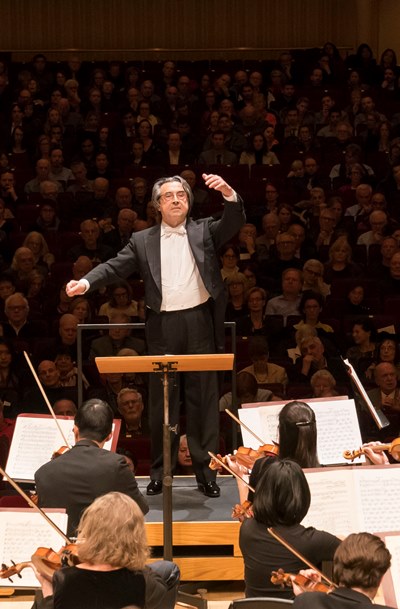 Crowning the first night was the still-voiced Romanticism of Martucci’s “Notturno.” After the final concert’s grand conclusion with Brahms’ Second Symphony, Muti and company offered the similarly quiescent entr’acte from Schubert’s “Rosamunde.” Both pieces bespoke the singing lines and elegant contours that Muti has transferred from the opera house to Orchestra Hall in Chicago: finesse at the root position of perfect symphonic harmony.
Crowning the first night was the still-voiced Romanticism of Martucci’s “Notturno.” After the final concert’s grand conclusion with Brahms’ Second Symphony, Muti and company offered the similarly quiescent entr’acte from Schubert’s “Rosamunde.” Both pieces bespoke the singing lines and elegant contours that Muti has transferred from the opera house to Orchestra Hall in Chicago: finesse at the root position of perfect symphonic harmony.
Each of the two concerts brought full houses to what is perhaps, and for good reason, the most celebrated concert hall in the world. If how you get to Carnegie Hall is practice, practice, practice, it was a very practiced and polished – indeed, burnished – Chicago Symphony that twice roused audiences into delirious whoops.
Brahms’ Second Symphony, which had sent the audience into raptures a few nights before at the Kennedy Center in Washington, D.C., topped off the consecutive concerts at Carnegie Hall with the thrill of magnificent understatement. This was gentle Brahms, gorgeous and warm, at once lyrical and towering.
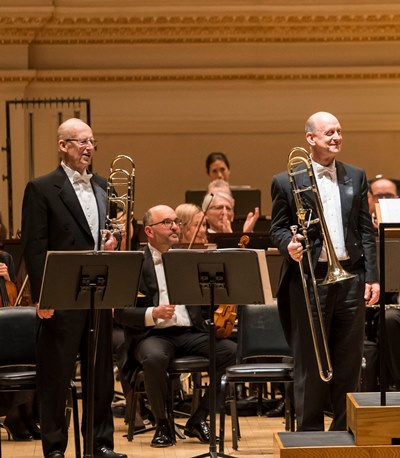 That Feb. 10 program also brought the New York premiere of Samuel Adams’ mystical “many words of love,” an almost Zen-like riff on a musical phrase from Schubert’s song-cycle “Die Winterreise.” And as it did in Washington, Adams’ intricate and innovative exploration of the orchestral palette drew keen appreciation from the audience in New York.
That Feb. 10 program also brought the New York premiere of Samuel Adams’ mystical “many words of love,” an almost Zen-like riff on a musical phrase from Schubert’s song-cycle “Die Winterreise.” And as it did in Washington, Adams’ intricate and innovative exploration of the orchestral palette drew keen appreciation from the audience in New York.
Yet it was the Carnegie opener, on Feb. 9, that perhaps showcased the CSO at its versatile best, starting with the stunning tapestry of Stravinsky’s “Scherzo fantastique.” Written when the composer, a protégé of Rimsky-Korsakov, was in his mid-twenties, the effervescent 11-minute scherzo shimmers with the feathery brilliance and fetching colors that soon would stamp Stravinsky’s break-out work, “The Firebird.” It is, so to speak, Russian music with an urbane accent, and Muti’s orchestra captured it to a T.
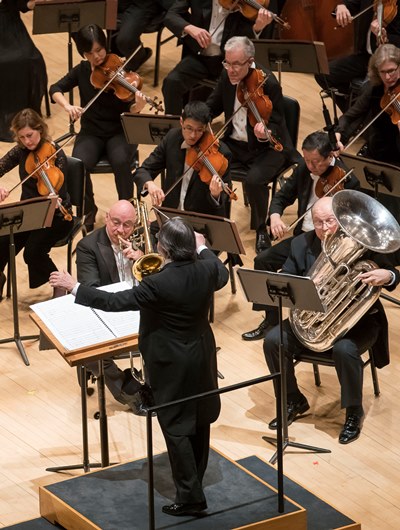 The same concert also offered the New York premiere of Jennifer Higdon’s Low Brass Concerto, by now almost casually in the grasp of CSO trombones Jay Friedman and Michael Mulcahy, bass trombone Charles Vernon and tuba Gene Pokorny. This was a performance beyond assured: It was fun – glowing, growling, both comfortable in its modernism and redolent of antiquity. Adams and Higdon were on hand for their premieres.
The same concert also offered the New York premiere of Jennifer Higdon’s Low Brass Concerto, by now almost casually in the grasp of CSO trombones Jay Friedman and Michael Mulcahy, bass trombone Charles Vernon and tuba Gene Pokorny. This was a performance beyond assured: It was fun – glowing, growling, both comfortable in its modernism and redolent of antiquity. Adams and Higdon were on hand for their premieres.
In this exceptionally attractive program, Muti balanced the dazzling Stravinsky and sonorous Higdon with the elegance of Chausson’s “Poème de l’amour and de la mer” for mezzo-soprano and orchestra and the sublime tone painting of Britten’s “Four Sea Interludes” from his opera “Peter Grimes.”
French mezzo-soprano Clémentine Margaine, who had sung the Chausson in Chicago, was again Muti’s soloist for the melancholy “Poème,” a triptych built of two large verse settings separated by a brief orchestral interlude. Margaine’s expressive singing was handsomely framed by the CSO’s languorous sound.
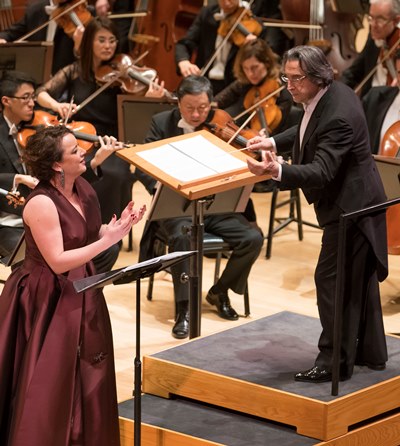 All that said, the Feb. 9 concert finale of Britten’s “Four Sea Interludes” was unexcelled even by the Brahms Second Symphony the next night. There’s a breath-stopping tragic weight in Britten’s transparent evocations of “Dawn” and “Moonlight” that Muti and the orchestra got exactly right; and the sheer dramatic impact of the final “Storm” was utterly overwhelming. How perfectly apt that Muti should turn to Martucci’s serene “Notturno” as encore-cum-benediction.
All that said, the Feb. 9 concert finale of Britten’s “Four Sea Interludes” was unexcelled even by the Brahms Second Symphony the next night. There’s a breath-stopping tragic weight in Britten’s transparent evocations of “Dawn” and “Moonlight” that Muti and the orchestra got exactly right; and the sheer dramatic impact of the final “Storm” was utterly overwhelming. How perfectly apt that Muti should turn to Martucci’s serene “Notturno” as encore-cum-benediction.
After playing out its tour down the East Coast with concerts in Naples and West Palm Beach, Fla., and Chapel Hill, N.C., the CSO returns to Chicago for concerts at Orchestra Hall with conductor Christoph Eschenbach and pianist David Fray from Feb. 22-27.
Related Link:
- Performance and ticket info for the Chicago Symphony’s next Orchestra Hall concerts Feb. 22-27: Details at CSO.org

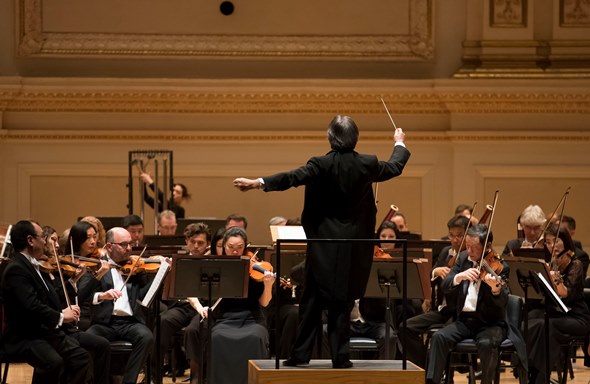

1 Pingbacks »